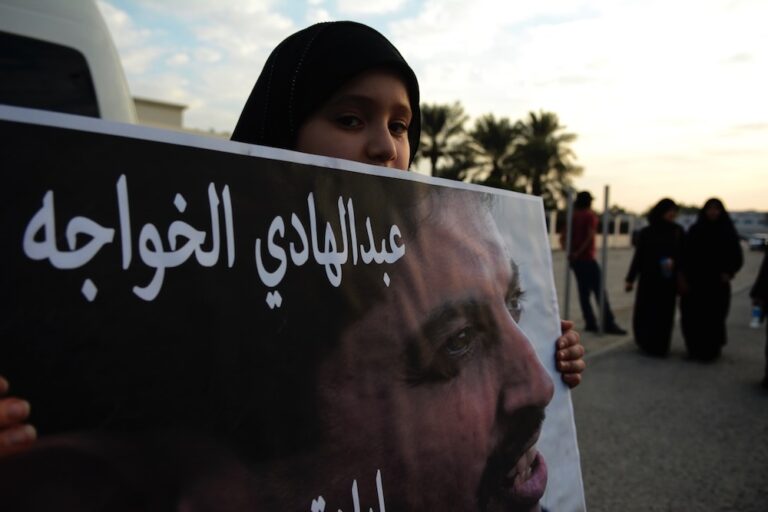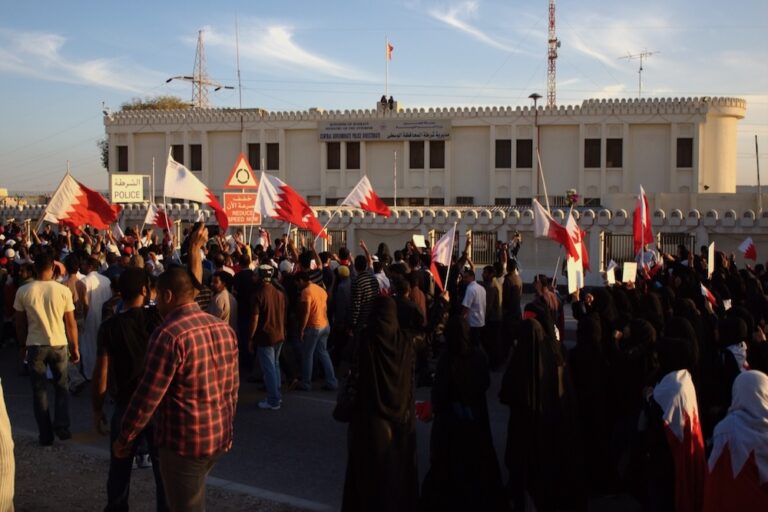While some Bahraini opposition members' sentences have been reduced, approximately 200 Bahrainis involved with the Islamic Action Society are still in prison.
(BCHR/IFEX) – 8 December 2012 – The Bahrain Center for Human Rights (BCHR) expresses its concern over the continued exploitation of civilian courts in the suppression of free speech, and particularly against political opposition leaders, which was most recently seen in the verdict against the leaders of the Islamic Action Society.
On 28 November 2012, the Higher Court of Appeal reduced the sentence of the General Secretary of the Islamic Action Society (Amal) Sheikh Mohammed Ali Al-Mahfoodh, to five years in prison, one year after a military court sentenced him to 10 years imprisonment on 4 October 2011. An additional three members of the same society had their military sentences reduced from 10 to five years in prison, five members had their sentences reduced from five years to either one year, six months, or one month, and these five individuals were therefore released for having completed their sentences. In addition, Shaikh AbdulAdheem Al-Muhtadi, who was accused in the same case and sentenced to five years’ imprisonment by the military court, has been acquitted after spending nearly two years in prison.
The charges against these opposition leaders included: “Promoting the overthrow of the government by force and illegal means, and resort to marches and rally the crowds to resist the authorities, and incitement to refrain from work.”
These charges are solely based on the coerced confessions of the defendants, which were made during a time when the authorities used torture as a means to extract false confessions. This has been well documented in the Bahraini Independent Commission of Inquiry report (BICI).
The daughter of Amal General Secretary, Al-Mahfoodh says that while in detention, her father was tortured, electrocuted, and whipped so badly she could barely recognize him when she saw him for first time several weeks after his arrest.
Throughout the appeal trial sessions, the defendants repeatedly informed the court of the torture they were subject to. The defendants stated that they were tortured by Bahraini and Jordanian officers, and that there were nurses and doctors who were responsible for checking the pulse of the tortured defendant to advise the officers on whether they could continue the torture when the victim collapsed. Witnesses have informed the court of the beating of the defendants at time of their arrest. Although the court formed a medical committee to examine the defendants, the court has avoided conducting a full investigation into these allegations of torture.
Hisham Al-Sabagh, a representative of the Amal Society has stated that there are approximately 200 individuals who are involved with the society currently detained in prison. The opposition society, which was licensed since 2005, was unjustly dissolved by a court ruling in July 2012.
While BCHR welcomes the acquittal of one defendant in the case, it stresses the fact that all the defendants should be acquitted and released immediately as their charges are directly related to the exercise of their freedom of expression and freedom of assembly. The prosecution has failed to provide any evidence of the use of violence by the opposition leaders in this case.
Several more opposition leaders are serving long-term prison sentences, including the General Secretary of the National Democratic Work Society, Ebrahim Sherif, who was sentenced to five years by a military court last year, and whose appeal was rejected in September 2012.
Based on the above, BCHR calls for the following:
• Release all the prisoners of conscience where the ruling was made in a court that lacks transparency and independence, and particularly the opposition leaders who were targeted for the practice of the freedom of expression and freedom of assembly in accordance with the universal declaration of human rights.
• Comply with the recommendations made in the Bahrain Independent Commission of Inquiry report, and especially the recommendations that indicate the necessity of investigating torture allegations and prosecuting those responsible for it, especially in the National Security Apparatus.
• Hold accountable all those involved in the National (Military) Safety Courts for the human rights violations committed against the defendants.


